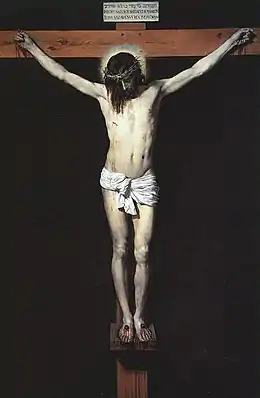Vexilla regis (Bruckner)
Vexilla regis (The royal banner), WAB 51, is the final motet written by the Austrian composer Anton Bruckner.
| Vexilla regis | |
|---|---|
| Motet by Anton Bruckner | |
 | |
| Key | Phrygian mode |
| Catalogue | WAB 51 |
| Text | Vexilla regis |
| Language | Latin |
| Performed | 15 April 1892: Vienna |
| Published | 1892: Vienna |
| Vocal | SATB choir |
History
Bruckner composed it on 9 February 1892.[1] The work, the manuscrit of which is archived at the Österreichische Nationalbibliothek,[2] is based on the Latin hymn Vexilla Regis by Venantius Fortunatus. It was first performed on Good Friday, 15 April 1892, and was published in the same year by Josef Weinberger, Vienna.[1]
In the Nowak-Bauernfeind new edition (Band XXI/29 of the Gesamtausgabe) the motet was re-issued with the revised text of the hymn and an additional 4-bar Amen.[3]
Music
Bruckner put strophes 1, 6 and 7 of the text in a motet of 108 bars in Phrygian mode for mixed choir a cappella.
Alike he did in Christus factus est WAB 11 and Virga Jesse WAB 52, Bruckner used the Dresdner Amen on the words prodeunt (bars 5-8), unica (bars 41-44), and Trinitas (bars 77-80).[1]
Although it is in Phrygian mode the motet is characterized by Bruckner's typical modulations, often to rather distant keys[4] and the integration of diverse musical styles: Bruckner biographer Howie remarks that "the remarkable mixture of the old and the new in this strophic piece could perhaps be interpreted as an attempt to sum up [Bruckner's] life's work".[5] Its "bleaker and uncompromising" close is suited to the Good Friday story.[6]
Selected discography
The first recording of Bruckner's Vexilla regis occurred in 1931:
- Ferdinand Habel with the Choir of the St. Stephans-Dom, Vienna (78 rpm: Christschall 130A)
A selection among the about 40 recordings:
- Eugen Jochum, Bavarian Radio Symphony Orchestra & Choir, Bruckner: Symphony No. 7, Psalm 150, Motets – LP: DG 139137/8, 1966
- Matthew Best, Corydon Singers, Bruckner: Motets – CD: Hyperion CDA66062, 1982
- Philippe Herreweghe, la Chapelle Royale/Collegium Vocale, Ensemble Musique Oblique, Bruckner: Messe en mi mineur; Motets – CD: Harmonia Mundi France HMC 901322, 1989
- Uwe Gronostay, Netherlands Chamber Choir, Bruckner/Reger – CD: Globe GLO 5160, 1995
- Magnar Mangersnes, Domchor Bergen, Bruckner: Motets – CD: Simax PSC 9037, 1996
- Dan-Olof Stenlund, Malmö Kammarkör, Bruckner: Ausgewählte Werke – CD: Malmö Kammarkör MKKCD 051, 2004
- Petr Fiala, Tschechischer Philharmonischer Chor Brno, Anton Bruckner: Motets – CD: MDG 322 1422-2, 2006
The large majority of the recordings are using the older score. Only a few recent recordings are using the score of the current edition of the Gesamtausgabe:
- Hans-Christoph Rademann, NDR Chor Hamburg, Anton Bruckner: Ave Maria – Carus 83.151, 2000
- Erwin Ortner, Arnold Schoenberg Chor, Anton Bruckner: Tantum ergo – CD: ASC Edition 3, issue of the choir, 2008
- Philipp von Steinäcker, Vocalensemble Musica Saeculorum, Bruckner: Pange lingua - Motetten - CD: Fra Bernardo FB 1501271, 2015
References
- van Zwol, Cornelis (2012). Anton Bruckner – Leven en Werken. Thot. pp. 709–710. ISBN 90-686-8590-2.
- U. Harten, p. 466
- Gesamtausgabe – Kleine Kirchenmusikwerke
- M. Auer, pp. 82-83
- Howie, A. Crawford (2004). "Bruckner and the motet". In Williamson, John (ed.). The Cambridge companion to Bruckner. Cambridge Companions to Music. Cambridge University Press. p. 62. ISBN 978-0-521-00878-5.
- Carver, Antony F. (February 2005). "Bruckner and the Phrygian Mode". Music and Letters. 86 (1): 74–99. doi:10.1093/ml/gci004.
Sources
- Max Auer, Anton Bruckner als Kirchenmusiker, G. Bosse, Regensburg, 1927
- Anton Bruckner – Sämtliche Werke, Band XXI: Kleine Kirchenmusikwerke, Musikwissenschaftlicher Verlag der Internationalen Bruckner-Gesellschaft, Hans Bauernfeind and Leopold Nowak (Editor), Vienna, 1984/2001
- Cornelis van Zwol, Anton Bruckner 1824–1896 – Leven en werken, uitg. Thoth, Bussum, Netherlands, 2012. ISBN 978-90-6868-590-9
- Uwe Harten, Anton Bruckner. Ein Handbuch. Residenz Verlag, Salzburg, 1996. ISBN 3-7017-1030-9
External links
- Vexilla regis, WAB 51: Scores at the International Music Score Library Project
- Free scores for Vexilla regis (Bruckner) in the Choral Public Domain Library (ChoralWiki)
- Vexilla regis phrygisch, WAB 51 Critical discography by Hans Roelofs (in German)
- Can be heard on YouTube:
- A live performance (Good Friday, 2011) by the Cantores Carmeli, Linz: Anton Bruckner – Vexilla regis
- A live performance (24 June 2017) by the Student Choir of Utrecht: Vexilla regis – Bruckner | USKO